新概念英语第一册第55课教学设计
- 格式:doc
- 大小:24.50 KB
- 文档页数:3
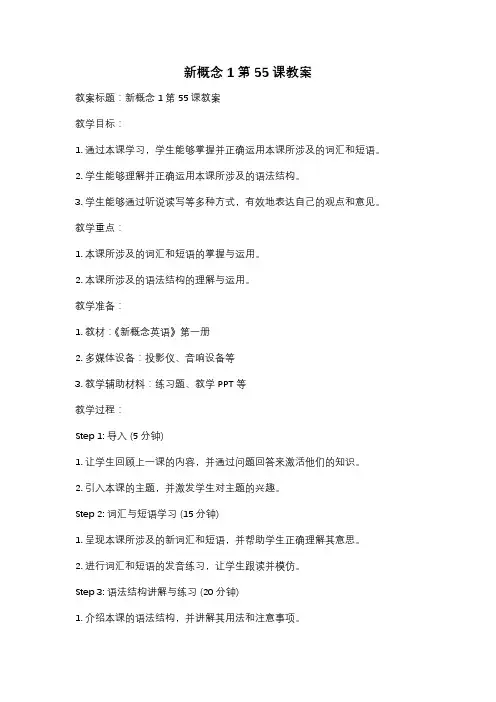
新概念1第55课教案教案标题:新概念1第55课教案教学目标:1. 通过本课学习,学生能够掌握并正确运用本课所涉及的词汇和短语。
2. 学生能够理解并正确运用本课所涉及的语法结构。
3. 学生能够通过听说读写等多种方式,有效地表达自己的观点和意见。
教学重点:1. 本课所涉及的词汇和短语的掌握与运用。
2. 本课所涉及的语法结构的理解与运用。
教学准备:1. 教材:《新概念英语》第一册2. 多媒体设备:投影仪、音响设备等3. 教学辅助材料:练习题、教学PPT等教学过程:Step 1: 导入 (5分钟)1. 让学生回顾上一课的内容,并通过问题回答来激活他们的知识。
2. 引入本课的主题,并激发学生对主题的兴趣。
Step 2: 词汇与短语学习 (15分钟)1. 呈现本课所涉及的新词汇和短语,并帮助学生正确理解其意思。
2. 进行词汇和短语的发音练习,让学生跟读并模仿。
Step 3: 语法结构讲解与练习 (20分钟)1. 介绍本课的语法结构,并讲解其用法和注意事项。
2. 利用示例句子和练习题,帮助学生理解和运用该语法结构。
3. 进行语法练习,巩固学生对该语法结构的掌握。
Step 4: 听力训练 (15分钟)1. 播放与本课内容相关的听力材料,让学生通过听力理解并获取相关信息。
2. 提供听力练习题,让学生根据听到的内容回答问题。
Step 5: 口语练习 (15分钟)1. 设计口语练习活动,让学生运用本课所学的词汇、短语和语法结构进行对话练习。
2. 分组进行角色扮演活动,让学生在实际情景中运用所学知识进行对话。
Step 6: 书面表达 (10分钟)1. 提供书面表达题目,要求学生根据所学内容进行书面表达练习。
2. 鼓励学生用自己的语言表达观点和意见,并给予适当的指导和反馈。
Step 7: 总结与作业布置 (5分钟)1. 总结本课的重点内容,并对学生的学习情况进行评价。
2. 布置相关的作业,巩固学生对本课所学知识的掌握。
教学拓展:1. 鼓励学生利用课外时间进行更多的阅读和听力练习,提高英语综合运用能力。

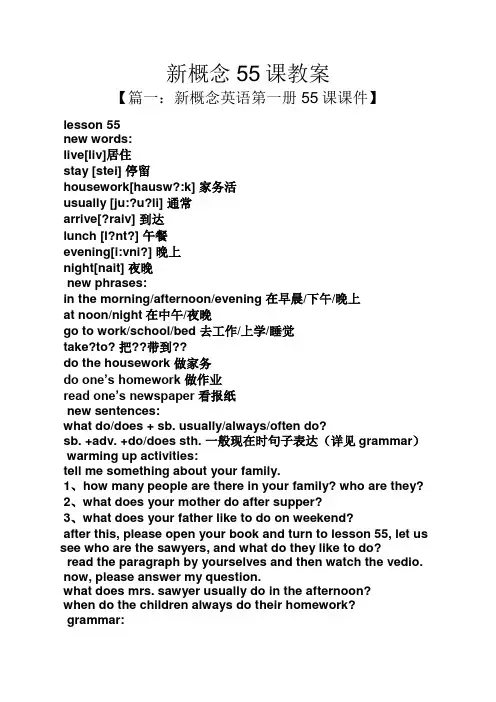
新概念55课教案【篇一:新概念英语第一册55课课件】lesson 55new words:live[liv]居住stay [stei] 停留housework[hausw?:k] 家务活usually [ju:?u?li] 通常arrive[?raiv] 到达lunch [l?nt?] 午餐evening[i:vni?] 晚上night[nait] 夜晚new phrases:in the morning/afternoon/evening 在早晨/下午/晚上at noon/night在中午/夜晚go to work/school/bed 去工作/上学/睡觉take?to? 把??带到??do the housework 做家务do one’s homework 做作业read one’s newspaper 看报纸new sentences:what do/does + sb. usually/always/often do?sb. +adv. +do/does sth. 一般现在时句子表达(详见grammar) warming up activities:tell me something about your family.1、how many people are there in your family? who are they?2、what does your mother do after supper?3、what does your father like to do on weekend?after this, please open your book and turn to lesson 55, let us see who are the sawyers, and what do they like to do?read the paragraph by yourselves and then watch the vedio. now, please answer my question.what does mrs. sawyer usually do in the afternoon?when do the children always do their homework?grammar:一般现在时:表示经常的习惯性的动作或者是现在的状态,常与表示频度的时间状语连用,表示客观事实或普遍真理。
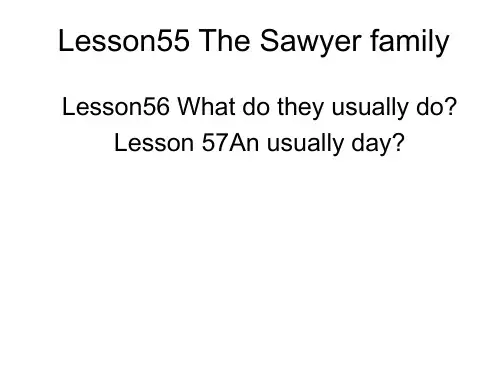
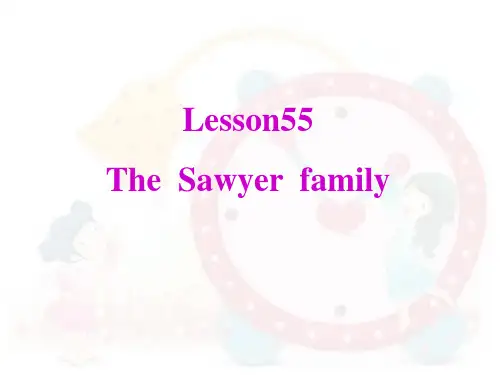
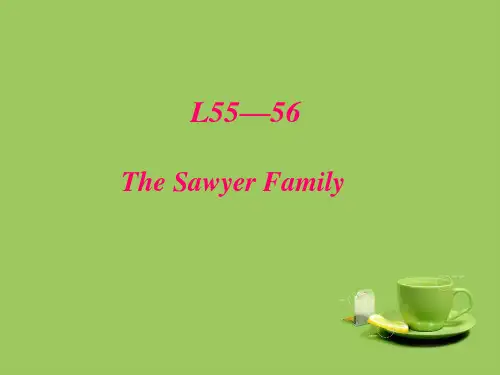
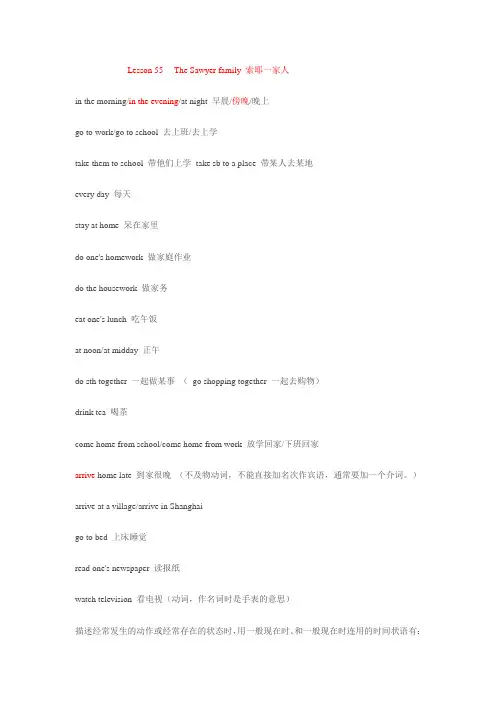
Lesson 55 ---The Sawyer family 索耶一家人in the morning/in the evening/at night 早晨/傍晚/晚上go to work/go to school 去上班/去上学take them to school 带他们上学take sb to a place 带某人去某地every day 每天stay at home 呆在家里do one's homework 做家庭作业do the housework 做家务eat one's lunch 吃午饭at noon/at midday 正午do sth together 一起做某事(go shopping together 一起去购物)drink tea 喝茶come home from school/come home from work 放学回家/下班回家arrive home late 到家很晚(不及物动词,不能直接加名次作宾语,通常要加一个介词。
)arrive at a village/arrive in Shanghaigo to bed 上床睡觉read one's newspaper 读报纸watch television 看电视(动词,作名词时是手表的意思)描述经常发生的动作或经常存在的状态时,用一般现在时。
和一般现在时连用的时间状语有:every day/at night/in the morning/in the afternoon/in the evening 经常连用的副词:usually/often/sometimesWhat do/does --- usually do? 某人通常做什么?breakfast/lunch/supper 早饭/中饭/晚饭The Sawyer s live at 87 King Street.姓氏后加s,前加定冠词the,表示某某一家人(the Smiths/the Johnsons)。
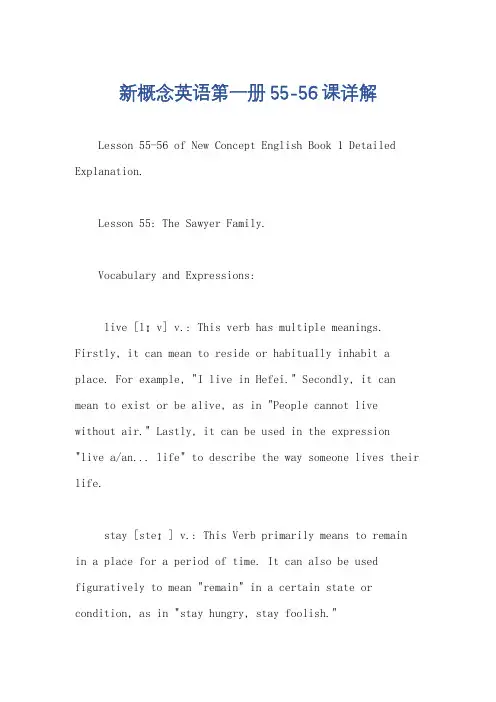
新概念英语第一册55-56课详解Lesson 55-56 of New Concept English Book 1 Detailed Explanation.Lesson 55: The Sawyer Family.Vocabulary and Expressions:live [lɪv] v.: This verb has multiple meanings. Firstly, it can mean to reside or habitually inhabit a place. For example, "I live in Hefei." Secondly, it can mean to exist or be alive, as in "People cannot live without air." Lastly, it can be used in the expression "live a/an... life" to describe the way someone lives their life.stay [steɪ] v.: This Verb primarily means to remain in a place for a period of time. It can also be used figuratively to mean "remain" in a certain state or condition, as in "stay hungry, stay foolish."home [həʊm] n./adv.: As a noun, it refers to the place where one lives. As an adverb, it means "to the place where one lives," as in "go home."housework ['haʊswɜːk] n.: This noun refers to the tasks related to maintaining a household, such as cleaning, cooking, and laundry.lunch [lʌnʃ] n.: This noun refers to the meal eaten in the middle of the day.afternoon [ɑːftə'nuːn] n.: This noun refers to the period of time between noon and evening.Text Explanation:Lesson 55 introduces the Sawyer family and their daily routine. The lesson begins by introducing the family members and their occupations. Mr. Sawyer works in an office, while Mrs. Sawyer stays at home. The children go to school. The lesson then goes on to describe their eveningactivities. Mr. Sawyer usually arrives home from work at about five o'clock, and the family then has their lunch together. In the afternoon, they often have a rest, andthen in the evening, they usually stay at home and watch television.Grammar Points:The use of "-s" or "-es" to form the third-person singular present tense of verbs is reinforced in this lesson. For example, "Mr. Sawyer usually arrives home from work at about five o'clock."The use of prepositions with "live" is also introduced. For example, "Mr. Sawyer lives in a town near London,"where "in" is used with a large place, and "Mrs. Sawyerlives at 87 King Street," where "at" is used with aspecific address.Lesson 56: What Do They Do?Vocabulary and Expressions:together [tə'geðə] adv.: This adverb means "in a group" or "side by side."evening ['iːvnɪŋ] n.: This noun refers to the time of day that comes after afternoon and before night.arrive [ə'raɪv] v.: This Verb means to reach a destination after a journey.night [naɪt] n.: This noun refers to the period of time from sunset to sunrise.Text Explanation:Lesson 56 continues the theme of the Sawyer family's daily life by asking the question, "What do they do?" The lesson provides information about the family's evening activities. Mr. Sawyer usually arrives home from work at about five o'clock, and then the family has their tea together. After tea, they usually sit in the living room and watch television. Sometimes, they go to the cinema orto the theater. On Sundays, they often go for a walk in the park.Grammar Points:The present tense of verbs is reinforced in this lesson, particularly the use of the third-person singular form.The lesson also introduces the use of modal verbs such as "can" and "usually" to express ability and frequency.Conclusion:Lessons 55 and 56 of New Concept English Book 1 focus on the Sawyer family's daily routine and activities. These lessons introduce new vocabulary and expressions related to family life, daily activities, and grammar points such as the use of "-s" or "-es" in the third-person singular present tense and the use of modal verbs. By learning these lessons, students can improve their understanding of family life in English-speaking countries and enhance theirlanguage skills in areas such as vocabulary, grammar, and comprehension.。
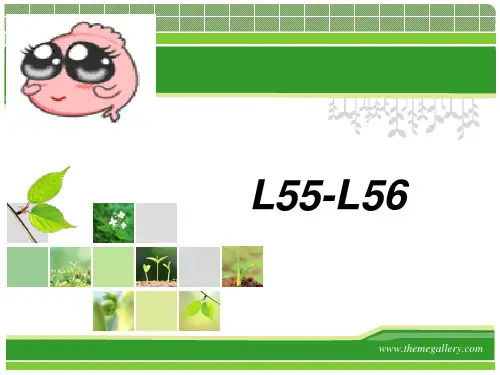
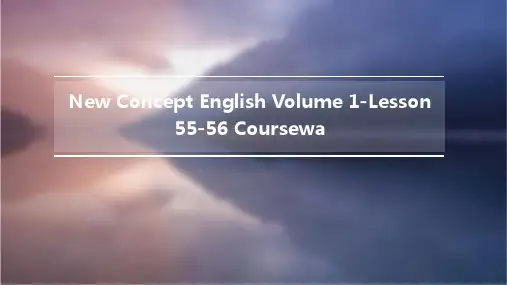
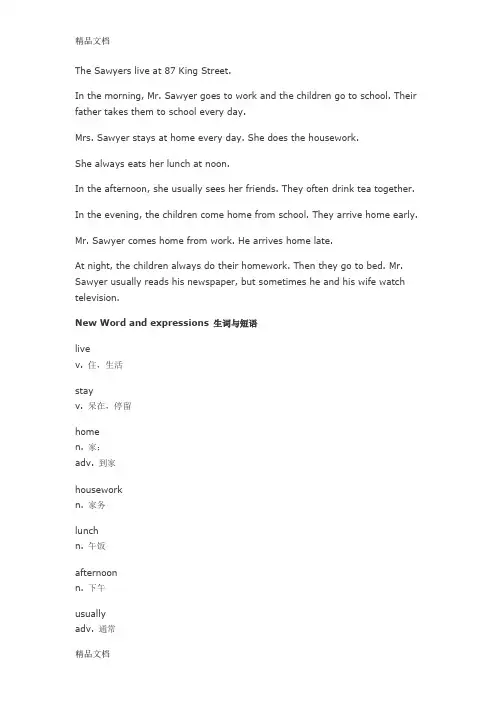
The Sawyers live at 87 King Street.In the morning, Mr. Sawyer goes to work and the children go to school. Their father takes them to school every day.Mrs. Sawyer stays at home every day. She does the housework.She always eats her lunch at noon.In the afternoon, she usually sees her friends. They often drink tea together.In the evening, the children come home from school. They arrive home early.Mr. Sawyer comes home from work. He arrives home late.At night, the children always do their homework. Then they go to bed. Mr. Sawyer usually reads his newspaper, but sometimes he and his wife watch television.New Word and expressions 生词与短语livev. 住,生活stayv. 呆在,停留homen. 家;adv. 到家houseworkn. 家务lunchn. 午饭afternoonn. 下午usuallyadv. 通常togetheradv. 一起eveningn. 晚上arrivev. 到达nightn. 夜间本文参考译文索耶一家住在国王街87号。
早上,索耶先生去上班,孩子们去上学。
新概念第55课教案设计
课型:New lesson
(2)教学内容与目的要求:
1、Learn Lesson 55
2、Learn Simple Present.
(3)重点句型及重点单词、词语:
(4)教学准备:
①Recorder ②tape ③phonogram cards ④word cards ⑤stars ⑥poster ⑦phonetic symbol cards ⑧teaching plan ⑨教学流程表⑩Pictures
(6)教学程序及教学游戏安排:
StepⅠ:Warming up exercise
1.Genral greeting
2.1.go to work, 上班。
3.由动词 go引导的短语课文中还有:go to school(上学), go to bed(上床睡觉)。
请注意work, school以及 bed之前不带任何冠词。
4. 2.stay at home, 呆在家里。
5.与 stay home在意思上相差无几。
前者中的 home是名词,后者中的home是副词。
6. 3.do the housework, 料理家务。
7.housework是不可数名词。
请比较:do the homework(做作业)。
8. 4.at night, 在夜里。
9.如果说某日夜里,则用介词 on: on the night of June 2 在6月2日的夜里
10.语法 Grammar in use
11.一般现在时(2)(请参见 Lessons 47~48语法部分。
)
12.一般现在时用于表示一个习惯动作、有规律的行为以及永恒的现象。
一般与时间频度副词和时间短语连用。
这些时间短语有:
13.every day/week/month/year 每日/周/月/年
14.in the morning/afternoon/evening 在上午/下午/晚上
15.at noon/night 在正午/夜里
16.第3人称单数的谓语动词需加以变化,这可分为几种情况:
17.(1)一般情况在动词后面直接加 -s,如:want----wants come----comes
arrive----arrives
18.(2)以-s, -x, -ch, -sh, -o 结尾的动词加 -es,如:fix----fixes wash----washes go----goes watch----watches do----does
19.(3)以辅音加 -y结尾的动词,把 -y改成 -i,再加 -es;而元音加 -y结尾的动词,只加 -s即可:
20.hurry----hurries carry----carries play----plays stay----stays
21.词汇学习 Word study
22. 1.arrive v.
23.(1)到达;到来:
24.We arrived home early. 我们很早就到家了。
25.The train is expected to arrive in London at 8. 20 p. m. 火车预计在晚上8点20分抵达伦敦。
26.(2)(时间等)来临;(婴儿)出生:
27.At last the day of graduation arrived. 毕业的那一天终于来临。
28.Elizabeth's baby arrived at midnight. 伊丽莎白的婴儿是在午夜时分降生的。
29. 2.live v.
30.(1)居住;生活:
31.Frank lives in Paris. 弗兰克居住在巴黎。
32.Where do you live? 你住在哪儿?
33.(2)活;生存:
34.Fish can't live long out of water. 鱼离开水活不了多久。
35.My grandmother lived until she was 94. 我祖母活到了94岁。
36.(3)过生活;享受生活乐趣:
37.At 40 he was just beginning to live. 他到40岁才刚刚开始过上富有意义的生活。
38.You haven't lived till you've been to Paris. 你没到过巴黎就算不上享受过生活。
39.(4)靠……生活(by/on):
40.He lives by playing the violin. 他靠拉小提琴为生。
41.He lives on the fortune left to him by his father. 他靠他父亲给他留下的财产生活。
42. 3.stay v.
43.(1)呆在,停留:
44.Mrs. White stays at home every day. 怀特太太每天都呆在家中。
45.(2)逗留;暂住:
46.We were staying at the same hotel. 我们住在同一家饭店。
47.(3)持续;保留:
48.The house has to stay exactly as it was. 这所房子必须完全保持原来的样子。
49.练习答案 Key to written exercises
50.Lesson 56
51. A
52. 1 The children go to school in the morning.
53. 2 Their father takes them to school.
54. 3 Mrs. Sawyer stays at home.
55. 4 She does the housework.
56. 5 She always eats her lunch at noon.
57. B
58. 1 What does she do in the morning? She always makes the bed in the morning. 59. 2 What does he do in the morning? He always shaves in the morning.
60. 3 What do they do in the evening? They sometimes listen to the stereo in the evening.
61. 4 What does he do every day? He always cleans the blackboard every day. 62. 5 What do they do at night? They always go to bed early at night.
63. 6 What does she do every day? She usually washes the dishes every day. 64.7 What do they do in the afternoon? They usually type some letters in the afternoon.
65.8 What does it do every day? It usually drinks some milk every day.
66.9 What do they do in the evening? They sometimes watch television in the evening. 67.10 What does she do at noon? She always eats her lunch at noon.
68.11 What does he do in the evening? He often reads his newspaper in the evening
69.
70.
StepⅣConclusion
1 Sound and read words together and tell the rules .
2 Tell parents important and difficult points.
3 Praise Ss who have the best attitude in the class.
4 Homework。